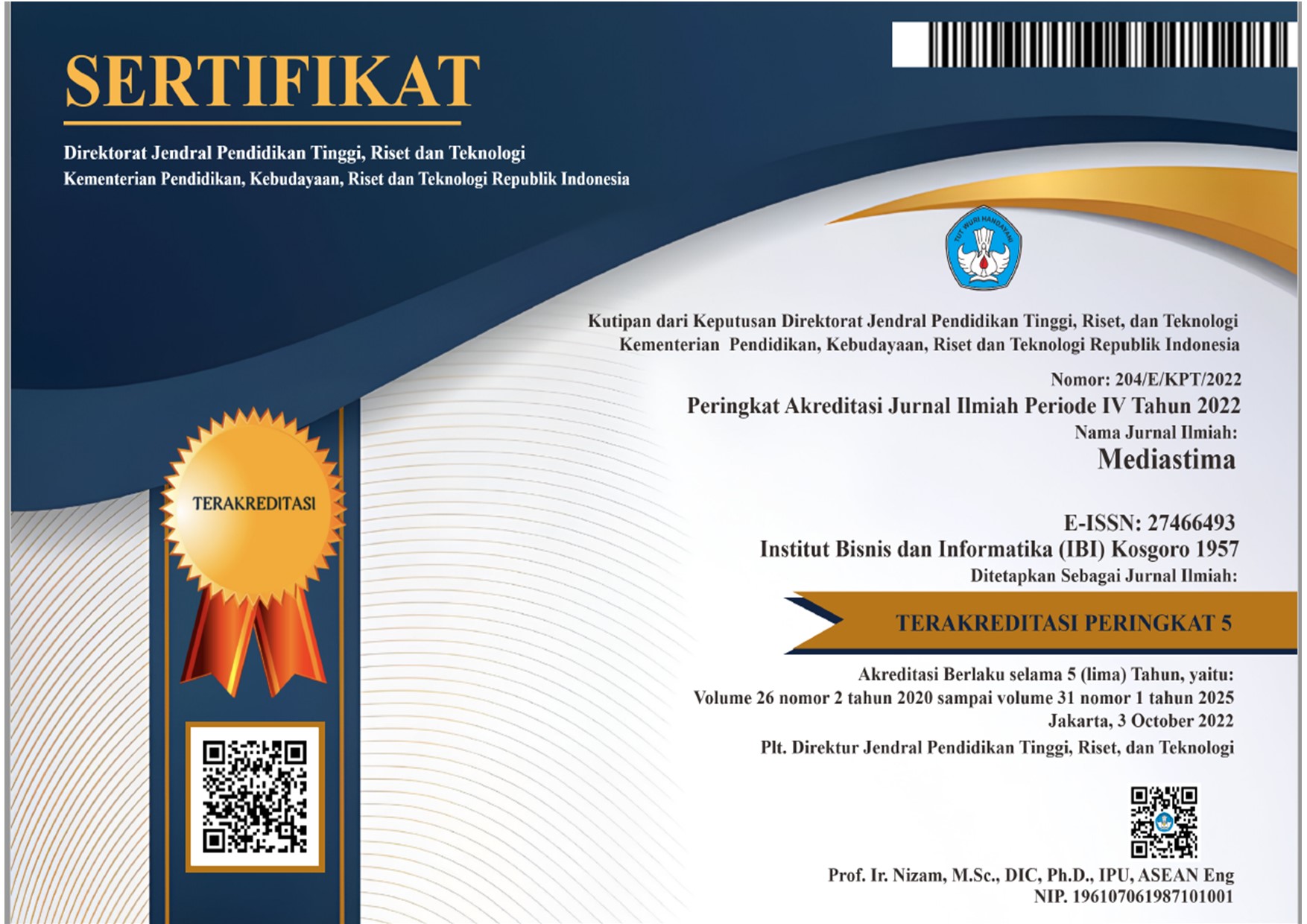Pengelolaan Perkampungan Budaya Betawi Setu Babakan dari Perspektif Tourism Supply Chain
DOI:
https://doi.org/10.55122/mediastima.v31i1.1623Keywords:
Betawi, Budaya, Setu Babakan, Tourism Supply ChainAbstract
Kawasan Perkampungan Budaya Betawi (PBB) Setu Babakan merupakan satu-satunya destinasi wisata yang mengemban amanat untuk membina dan melindungi, menciptakan dan menumbuhkembangkan nilai-nilai seni dan budaya Betawi. Namun dalam perkembangannya belum dapat dikelola secara maksimal. Penelitian ini bertujuan untuk menggali lebih dalam mengenai pengelolaannya dengan metode studi eksploratif dengan pendekatan kualitatif. Narasumber dipilih secara purpossive dengan kriteria adalah seseorang yang secara langsung terhubung dengan pengelolaan kawasan PBB Setu Babakan tersebut dan mengetahui secara mendalam dinamika dalam pengelolaan kawasan PBB Setu Babakan. Hasil penelitian ini menunjukkan konsep tourism supply chain belum dapat terimplementasi sebagaimana idealnya. Hal ini disebabkan seluruh pengelolaannya masih tersentral pada satu Unit Pengelola Kawasan. Pengelolaan kawasan PBB Setu Babakan tidak mungkin bisa maksimal jika hanya dikelola sendiri, oleh karena itu melibatkan pihak ketiga yang kredibel dapat menjadi salah satu solusi untuk pengelolaan yang lebih profesional. Kebijakan pemerintah daerah yang konsisten dan tegas masih sangat dibutuhkan dalam melestarikan dan menjaga budaya Betawi yang semakin tergerus oleh kemajuan teknologi.
References
Afemei, G. (2024). Essentials of Supply Chain Management. Toronto Academic Press,. https://library.gift/main/97527ED42F6363E3186C1195D0E9A7C7
Arsath, M. A. (2018). Social Media Marketing: Advantages and Disadvantages. Shanlax International Journal of Management, 6(S1), 152–158. https://www.shanlax.com/wp-content/uploads/SIJ_MGT_Oct2018_V6_N1_032.pdf?srsltid=AfmBOoqxsVQImCFuscMbH2_tXscdCZbRNyytR6aXUOaJvNhocwIuDrQC
Creswell, J. W., & Creswell, J. D. (2023). Research design : qualitative, quantitative, and mixed methods approaches (6th ed.). SAGE Publications, Inc.
Erislan. (2016). Tourist Attraction and the Uniqueness of Resources on Tourist Destination in West Java, Indonesia. Review of Integrative Business and Economics Research, 6(1), 251–266. http://buscompress.com/uploads/3/4/9/8/34980536/riber_h15-149__251-266_.pdf
Fakhrona, S., Sari, N., & Rukmi, W. I. (2021). Penilaian Kualitas Kawasan Wisata Alam dan Budaya PBB Setu Babakan, DKI Jakarta. Planning for Urban Region and Environment, 10(2), 195–206.
Fu, L., Zhang, Q., Tang, Y., Pan, J., & Li, Q. (2023). Assessment of urbanization impact on cultural heritage based on a risk-based cumulative impact assessment method. Heritage Science, 11(1), 2–15. https://doi.org/10.1186/s40494-023-01024-0
Hair, J. F., Page, M., & Brunsveld, N. (2020). Essentials of Business Research Methods (4th ed.). Routledge -Taylor & Francis Group.
Hellen, H., & Susanto, P. (2024). Pengaruh Daya Tarik Wisata terhadap Minat Berkunjung Kembali Wisatawan di Kawasan Perkampungan Budaya Betawi Setu Babakan. Kaganga:Jurnal Pendidikan Sejarah Dan Riset Sosial Humaniora, 7(2), 912–929. https://journal.ipm2kpe.or.id/index.php/KAGANGA/article/view/10561
Konovalov, E., Murphy, L., & Moscardo, G. (2019). An Exploration of Links between Levels of Tourism Development and Impacts on the Social Facet of Residents’ Quality of Life. In A. M. Campón-Cerro, J. M. Hernández-Mogollón, & J. A. Folgado-Fernández (Eds.), Best Practices in Hospitality and Tourism Marketing and Management (pp. 77–107). Springer International Publishing. https://doi.org/10.1007/978-3-319-91692-7
Loi, L. T. I., So, A. S. I., Lo, I. S., & Fong, L. H. N. (2017). Does the quality of tourist shuttles influence revisit intention through destination image and satisfaction? The case of Macao. Journal of Hospitality and Tourism Management, 32, 115–123. https://doi.org/10.1016/j.jhtm.2017.06.002
Molete, M. C., & Phindane, P. (2020). The Loss of Cultural and Language Identity by Black South Africans Due To Industrialisation/Urbanisation. In G. A. Moens, D. Wickramasinghe, K. Ahmed, & K. Pirzada (Eds.), Global Conference on Business and Social Sciences Proceeding (pp. 149–158). Global Academy of Training and Research (GATR) Enterprise. https://doi.org/10.35609/gcbssproceeding.2020.11(167)
Musthofa, B. M. (2020). Aplikasi Betawi Akses: model strategi pelestarian budaya Betawi di era teknologi informasi dan komunikasi masa kini. Jurnal Sosial Humaniora Terapan, 2(2), 146–152. https://scholarhub.ui.ac.id/jsht/vol2/iss2/14
Neuman, W. L. (2014). Social Research Methods: Qualitative and Quantitative Approaches (7th ed.). Pearson Education Limited.
Ogonowska, M., & Torre, D. (2016). Toward a Sustainable Tourism: Performance, Strategies, and Sustainability. In M. M. Mariani, W. Czakon, D. Buhalis, & O. Vitouladiti (Eds.), Tourism Management, Marketing, and Development (1st ed., pp. 195–213). Palgrave Macmillan. https://doi.org/https://doi.org/10.1057/9781137401854
Panjaitan, F., & Simarmata, J. (2017). The Influence of Destination and Transportation on Tourist Satisfaction and its Impact on the Loyalty of the Tourists Visiting the North Sumatera Lake Toba. Proceedings of the International Conference on Tourism, Gastronomy, and Tourist Destination (ICTGTD 2016), 170–173. https://doi.org/10.2991/ictgtd-16.2017.31
Richards, G. (2002). Tourism attraction systems. Annals of Tourism Research, 29(4), 1048–1064. https://doi.org/10.1016/S0160-7383(02)00026-9
Soratana, K., Landis, A. E., Jing, F., & Suto, H. (2021). Supply Chain Management of Tourism Towards Sustainability. Springer International Publishing. https://doi.org/10.1007/978-3-030-58225-8
Taptiani, N., Mahadi, A., Romadhon, I. F., Pratama, A. M., Muhammad, R., Purwanto, E., Sari, D. N., & Isbandi, F. S. (2024). The Impact of Globalization on Local Culture. International Journal of Progressive Sciences and Technologies (IJPSAT), 45(1), 92–102.
World Tourism Organization. (2019). UNWTO Tourism Definitions | Définitions du tourisme de l’OMT | Definiciones de turismo de la OMT. World Tourism Organization (UNWTO). https://doi.org/10.18111/9789284420858
World Tourist Organization. (2023). Outcomes from the UNWTO Affiliate Members World Expert Meeting on Cultural Tourism, Madrid, Spain, 1–2 December 2022. World Tourism Organization (UNWTO). https://doi.org/10.18111/9789284424740
Zhao, Y., Wang, H., Guo, Z., Huang, M., Pan, Y., & Guo, Y. (2022). Online Reservation Intention of Tourist Attractions in the COVID-19 Context: An Extended Technology Acceptance Model. Sustainability, 14(16), 1–17. https://doi.org/10.3390/su141610395






